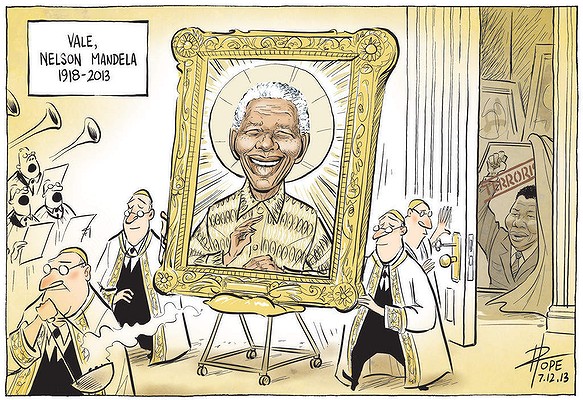Search
Democracy Links
Member's Off-site Blogs
through a looking glass ....

His smile was like sunshine, but Nelson Mandela was made of steel. It was his strength of character, repeatedly tested throughout his long and impossibly full life, that made him one of the towering political figures of our time.
"Our nation has lost its greatest son," South African President Jacob Zuma said Thursday as he announced Mandela's death at age 95. Zuma was being modest. Mandela belonged to the world.
As the encomiums flood in from around the globe, it is important to remember that Mandela was not always held in such universal esteem. Ronald Reagan and Margaret Thatcher, to name two one-time detractors, considered the organization he headed, the African National Congress, a terrorist group that was trying to overthrow South Africa's legitimate government.
By the 1980s, though, it was becoming clear to most of the world that the white-run apartheid government in Pretoria had no legitimacy. Mandela had been in prison for more than two decades, but moral authority in the nation was shifting his way. That political authority would follow seemed inevitable; the manner in which it would arrive, however, was very much in doubt.
Mandela was released in 1990 after 27 years of incarceration, much of it on Robben Island, a prison where the white government tried to isolate its most threatening political enemies - and ended up providing Mandela with a headquarters in which to teach, organize and ultimately practice the art of revolution.
After his release, he visited world capitals, including Washington. That was the one time I met the man: He came to The Washington Post for lunch, and I, like everyone else, was star-struck by his charisma. I recall being struck, too, by his vigor and energy. Most men would have been broken by what Mandela had endured. He seemed to be just getting started.
Thus began the most remarkable period of Mandela's life - the years that made him such a historic figure.
South Africa's apartheid government had been brutally repressive for nearly five decades, and the country's black majority was justifiably full of anger. Mandela led his people in channeling that anger - not suppressing it but using it in constructive ways. He negotiated a transition that acknowledged the right of white South Africans to be citizens but no longer lords and masters. He did not forgive the torturers and the murderers - the worst crimes would be brought to light - but he refused to seek revenge.
When Mandela took office as president in 1994, he governed with the same generosity. Few could have imagined that South Africa could move peacefully to black majority rule. Without Mandela's leadership - without his example, stature and wisdom - the story might have been radically different.
The world remembers the great leader who acted without bitterness. But Mandela could play that role only because of his decades of implacable opposition to a system that he knew was evil.
So we should remember not only the man who embraced his former enemies but also the man who refused to be bowed by them, who remained militant despite 27 years of imprisonment, who walked out of jail and into freedom with his head held high and his eyes toward the future.
At the end of his presidency, Mandela gave the world another example: He showed how a great leader, raised to power by the will of his people, could step down as the constitution envisioned. George Washington taught Americans this same lesson. Because of Mandela's willingness to walk away, peaceful democratic transition is the norm in South Africa.
Madiba, as he was familiarly known to South Africans, personified his country in a way that few individuals have. It is no exaggeration to say that he served as the conscience of his nation. Many people thought of him as the conscience of the world.
After his tenure as president, Mandela acted as a global elder statesman, an adviser, mediator and honest broker in times of crisis. In his later years, he suffered from dementia. As long as he drew breath, however, he was a living symbol of hope and triumph. He will be desperately missed.
"He belongs to the ages," President Obama said. But it is hard to let him go.
- By John Richardson at 7 Dec 2013 - 6:31am
- John Richardson's blog
- Login or register to post comments
Recent comments
4 hours 18 min ago
4 hours 31 min ago
5 hours 11 min ago
5 hours 45 min ago
6 hours 2 min ago
8 hours 42 min ago
9 hours 25 min ago
9 hours 33 min ago
10 hours 44 min ago
12 hours 30 sec ago